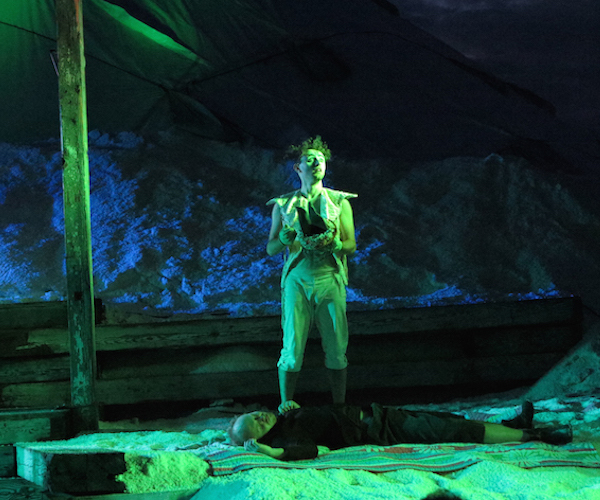Theater Review: “A Midsummer Night’s Dream” — A Heartfelt Spell
This Midsummer Night’s Dream is a pleasant enough entertainment that is helped mightily by the bucolic waterfront setting.
A Midsummer Night’s Dream by William Shakespeare. Directed by Danielle Fauteux Jacques. Staged by Apollinaire Theatre Company at PORT Park, 99 Marginal Street, Chelsea, MA, through July 29.

Benjamin Finn as Puck in the Apollinaire Theatre Company production of “A Midsummer Night’s Dream.” Photo: Danielle Fauteuil Jacques.
By Bill Marx
Like the mischievous Puck, William Shakespeare’s A Midsummer Night’s Dream can mutate into various shapes and sizes: the worldly and the otherworldly, the erotic and sadistic, the farcical and the political, the weird and the wise. Placed in that auteurist spectrum, Apollinaire Theatre Company’s outdoor version would best be described as good-natured. There’s nothing kinky or disturbing here, no intimations of violence or bestial nightmare. Director Danielle Fauteux Jacques has cut the script for speed, and keeps the proceedings straightforward and domestic, generally driving through the poetry rather than cultivating it. The result is a pleasant enough entertainment that is helped mightily by the bucolic waterfront setting at PORT Park, which switches, memorably, to the nearby salt piles at the Eastern Salt Company for an arctic-ish landscape interlude.
In addition, the performers are not mic’ed up to their tonsils as they are in the annual Boston Commonwealth Shakespeare extravaganza. Yes, overhead aircraft drown out one and all, including the mighty Oberon, from time to time. (The awkwardly staged opening scene doesn’t help; Jacques has some of the actors speak with their backs to the audience.) But that is fine — the unaided human voices can only go so far. This is the Bard on a human — rather than a super-sized — scale.
The staging’s amiable approach pretty well banishes naughty supernaturalism and/or aristocratic arrogance. Demetrius Fuller, who provides some genial guitar playing, is a nice guy of a Theseus; he has no romantic problems with Rydia Q. Vielehr’s worshipful Hippolyta. Some productions exploit the possibility of friction between the couple early on: the presence of a captive Amazon hints at discord, mirroring the frazzled relationship between Titania and Oberon. But we are given a very cuddly twosome. Tony Dangerfield’s cranky Egeus and the riled-up up quartet of Hermia (Olivia Z. Cote), Lysander (Jon Vellante), Demetrius (John Manning), and Helena (Kelly Young) serve up a serviceable fracas, but it lacks visceral passion. Granted, the couples are bland from the get-go, but here they are kept at a physical distance from each other, diffusing the possibility of butting heads and/or emotional sparks — either of love or anger. (Though, once the young performers hit the salt piles, they have plenty of fun with the physicality of the farce. They bump their heads and scamper up and around the ghostly space with vigor.)

r to l: Cassie Foote (Oberon) talks things over with Michael John Ciszewski (Titania) and the fairies. Photo: Danielle Fauteux Jacques.
The production comes into its own with the move into the forest, in this case the lunar-ish surface of the area in front of the covered salt piles. It is Nature de-natured, packaged in canvas. Cassie Foote’s Oberon and Benjamin Finn’s Puck proffer street-wise attitude (rather than the attitude of badass goblins), but they are energetic enough to kick the hapless mortals around with aplomb. Michael John Ciszewski’s preening Titania is among the few I have ever seen who refuses the role of passive victim. This queen has more enough enchanted pizazz to throttle Oberon, which she does on a couple of occasions. The emphasis is on zesty comedy rather than a world out of joint — though when the salt mounds are lit green and red it creates a strikingly alien landscape. And it is fun to see the actors grabbing handfuls of the salt of the earth. Brooks Reeves’ hyperactive Bottom gives us a sweet-natured — rather than egotistical — wanna-be star, his animation overshadowing the other (somewhat comically repressed) rude mechanicals, including Joey C. Pelletier’s surprisingly contained Peter Quince.
The return to the PORT Park space, overlooking the waterfront, brings it all home in an amusingly homey, even touching way. I have rarely seen the play-within-the-play fail, and it is very funny here. How can you miss when Moonshine has a real dog in tow? Samuel Warton’s Flute suggests, with his enthusiastically passionate turn as Thisbe, that he might just be living out a hidden fantasy. The sarcasm of the young lovers and Theseus is minimized, the argument of the value of poetry excised, the strengths of the outdoor setting maximized. The sun is down and the moon is up — glowing lanterns hang around the stage. Puck picks up a guitar and strums while the fairies move through the audience, the wings mounted on their white lacy outfits lit bright. They hand out glow wands to theatergoers and we are invited to wave them along to the music. Which everyone does, of course. Somehow, this Midsummer Night’s Dream manages to be magical and cozy at the same time. Nobody, even Puck, seems ready to indulge in any future misbehaving. Talk about a fantasy …
Bill Marx is the editor-in-chief of The Arts Fuse. For over three decades, he has written about arts and culture for print, broadcast, and online. He has regularly reviewed theater for National Public Radio Station WBUR and The Boston Globe. He created and edited WBUR Online Arts, a cultural webzine that in 2004 won an Online Journalism Award for Specialty Journalism. In 2007 he created The Arts Fuse, an online magazine dedicated to covering arts and culture in Boston and throughout New England.
